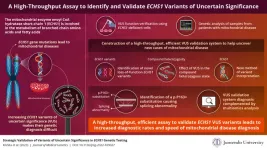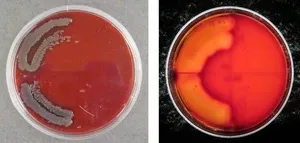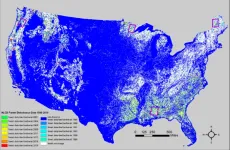The gene ECHS1 encodes for enoyl-CoA hydratase short-chain 1, a mitochondrial enzyme involved in branched-chain amino acid and fatty acid metabolism. Rare inherited mutations in the ECHS1 lead to mitochondrial ECHS1 deficiency, resulting in the disruption of the metabolism of the essential amino acid valine and accumulation of valine intermediates.
In fact, ECHS1 is one of the most common causative genes of mitochondrial diseases. These mutant enzymes also cause brain lesions and severe delays in a child’s psychomotor development, along with elevating blood lactate levels. ECHS1 variants have been reported globally, and many disease-causing mutations have been identified throughout the ECHS1 gene. Recent advances in genetic testing have enabled the diagnosis of numerous new cases with ECHS1 variants. However, they have also led to an increase in the number of ECHS1 variants of unrecognized significance (VUS), which pose a major barrier to genetic diagnosis. Assays combining Clustered Regularly Interspaced Short Palindromic Repeats (CRISPR)/Cas9 and genomic sequencing are routinely used to identify ECHS1 VUS in cancers. However, the role of VUS in rare diseases and the molecular mechanisms underlying the formation of these ECHS1 variants remains poorly understood.
Now a team of researchers led by Professor Yasushi Okazaki from the Intractable Disease Research Center at Juntendo University in Tokyo, Japan, and comprising colleagues Yoshihito Kishita and Ayumu Sugiura, among others, has developed a rapid, efficient assay system for validating ECHS1 variants.
Their findings and their potential implications have been described in a new study published in The Journal of Medical Genetics on April 13, 2023. "Diagnosing mitochondrial disease has never been easier thanks to next-generation sequencing technology. However, merely 40% of cases are diagnosed, and 30% have VUS where we cannot predict pathogenicity," says Dr. Okazaki, explaining his motivation for pursuing the research. The time had come for a high-throughput VUS validation system, as correctly annotating ECHS1 variants will aid the rapid genetic diagnosis of mitochondrial diseases and lead to their early treatment.
The first step in developing the high-throughput assay to verify VUS function involved cataloging ECHS1 variants by expressing synthetic complementary DNAs (cDNAs) containing VUS in ECHS1 knockout cells. The group simultaneously performed a genetic analysis using samples from patients with mitochondrial disease. Finally, they verified the effect on gene expression in confirmed cases by using RNA sequencing and proteome analysis. This process of functional VUS validation helped to identify novel variants causing loss of ECHS1 function.
Discussing the team's main findings, Dr. Okazaki says, "Despite its complexity, our high-throughput assay quickly pinpointed the VUS that contributed to the loss of function in ECHS1. Importantly, we identified a new synonymous substitution causing a splicing abnormality, and this assay provides a robust platform to interpret these variants." Another advantage of the new assay is its ability to reveal the effect of the VUS in the compound heterozygous state – when each parent donates a mutant allele, both of which harbor different mutations. Additionally, it provided a new approach for variant interpretation.
The group was also buoyed when their complementary "omics" analysis caught some cases that had not been diagnosed by the assay. By providing a means to support the rapid genetic diagnosis or early- and late-onset mitochondrial disease, these clinicians are confident that they can improve the quality of life of patients with mitochondrial disease.
But what relevance do the study’s findings have for future genetic diagnosis?
Along with revealing new ECHS1 cases, this validation assay can also be used for the functional evaluation of other genes associated with mitochondrial diseases, making early treatment a reality for many patients. "The VUS validation of other genes is reproducible and has already begun. Our team has successfully identified variants in the mitochondrial respiratory chain complex I," concludes Dr. Okazaki with justified pride.
Funding This study was supported by a grant for the Practical Research Project for Rare/Intractable Diseases from AMED (Fund ID: JP21im0210625, JP21ek0109511, JP22ek0109485, JP22ek0109468, JP19ek0109273), Program for Promoting Platform of Genomics based Drug Discovery (Fund ID: JP22kk0305015), the Research Center Network for Realization of Regenerative Medicine (The Acceleration Program for Intractable
Reference
Authors
Title of original paper
Journal
Yoshihito Kishita,1,2 Ayumu Sugiura,2 Takanori Onuki,3 Tomohiro Ebihara,4 Tetsuro Matsuhashi,3 Masaru Shimura,3 Takuya Fushimi,3 Noriko Ichino,2 Yoshie Nagatakidani,1 Hitomi Nishihata,1 Kazuhiro R Nitta,2 Yukiko Yatsuka,2 Atsuko Imai-Okazaki,2 Yibo Wu,5,6 Hitoshi Osaka,7 Akira Ohtake,8,9 Kei Murayama,3,10 Yasushi Okazaki, 11, 12
Strategic validation of variants of uncertain significance in ECHS1 genetic testing
Journal of Medical Genetics
DOI
Affiliations
10.1136/jmg-2022-109027
1Department of Life Science, Faculty of Science and Engineering, Kindai University, Japan
2Diagnostics and Therapeutics of Intractable Diseases, Intractable Disease Research Center, Juntendo University, Graduate School of Medicine, Japan
3Department of Metabolism, Chiba Children’s Hospital, Japan
4Department of Neonatology, Chiba Children’s Hospital, Japan
5Chemical Biology Mass Spectrometry Platform (CHEMBIOMS), University of Geneva, Switzerland
6YCI Laboratory for Next-Generation Proteomics, RIKEN Center of Integrative Medical Sciences, Japan
7Department of Pediatrics, Jichi Medical University, Japan
8Department of Pediatrics & Clinical Genomics, Faculty of Medicine, Saitama Medical University, Japan
9Center for Intractable Diseases, Saitama Medical University Hospital, Japan
10Center for Medical Genetics, Chiba Children’s Hospital, Japan
11Diagnostics and Therapeutics of Intractable Diseases, Intractable Disease Research Center, Juntendo University, Graduate School of Medicine, Bunkyo-ku, Tokyo, Japan ya-okazaki@juntendo.ac.jp.
12Laboratory for Comprehensive Genomic Analysis, RIKEN Center for Integrative Medical Sciences, Japan
END






